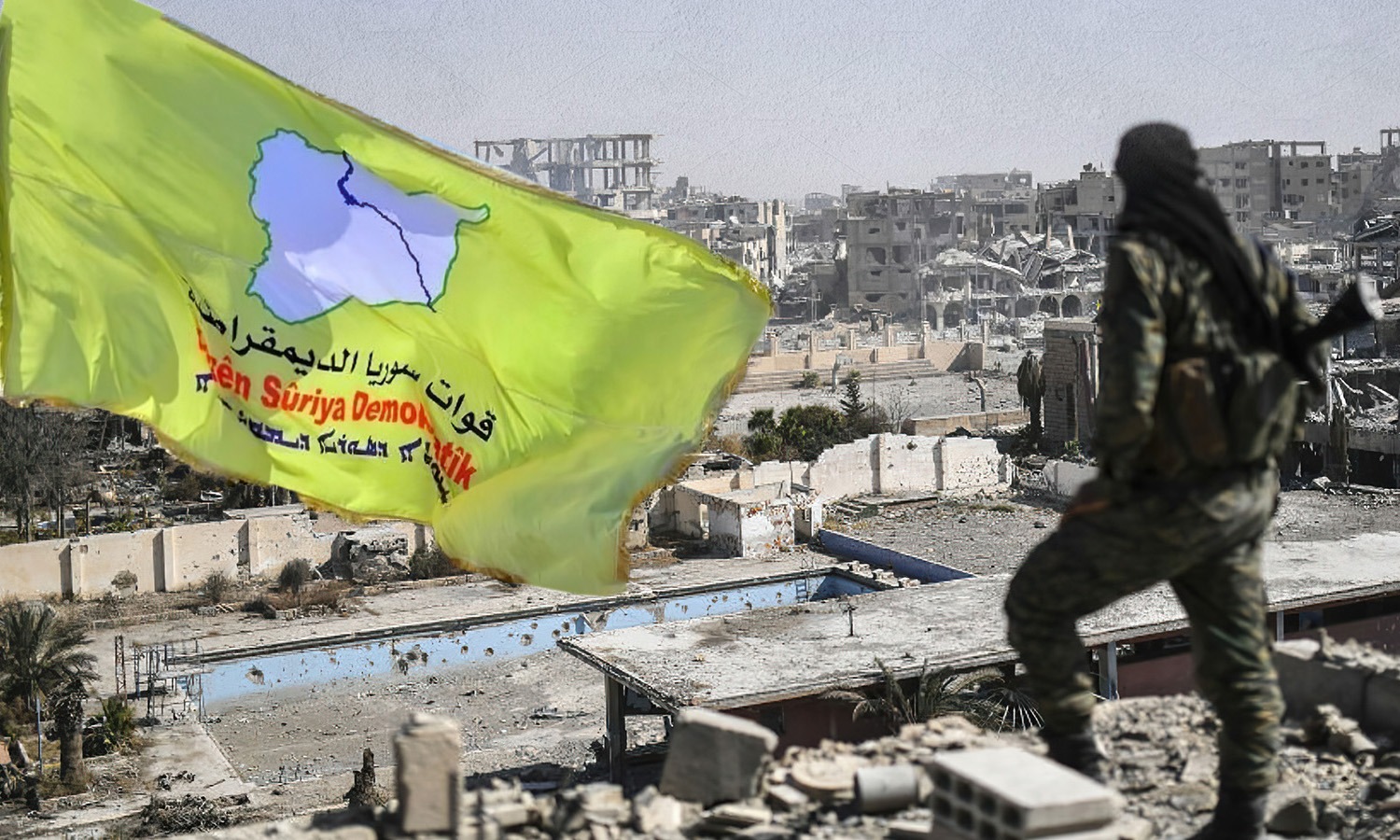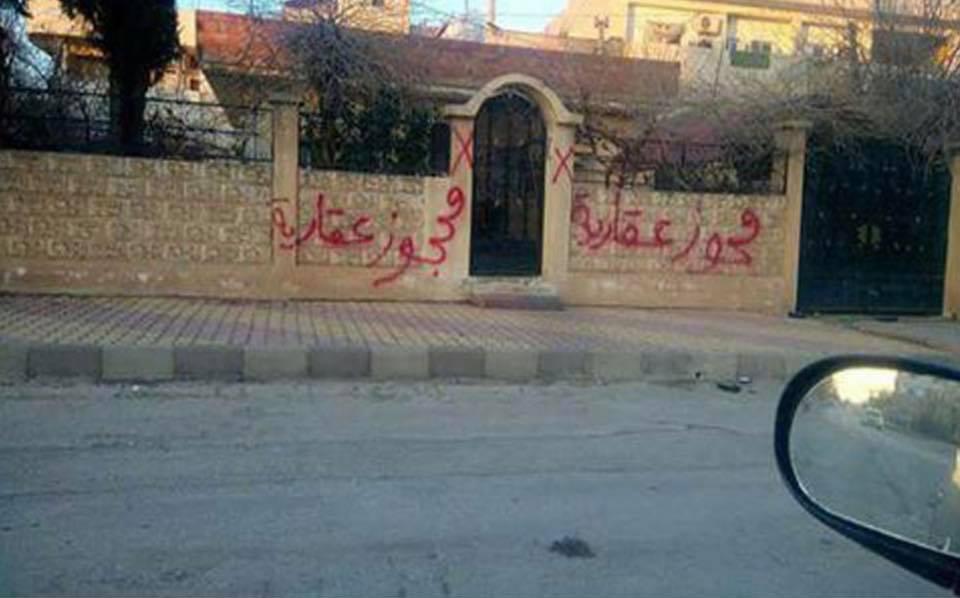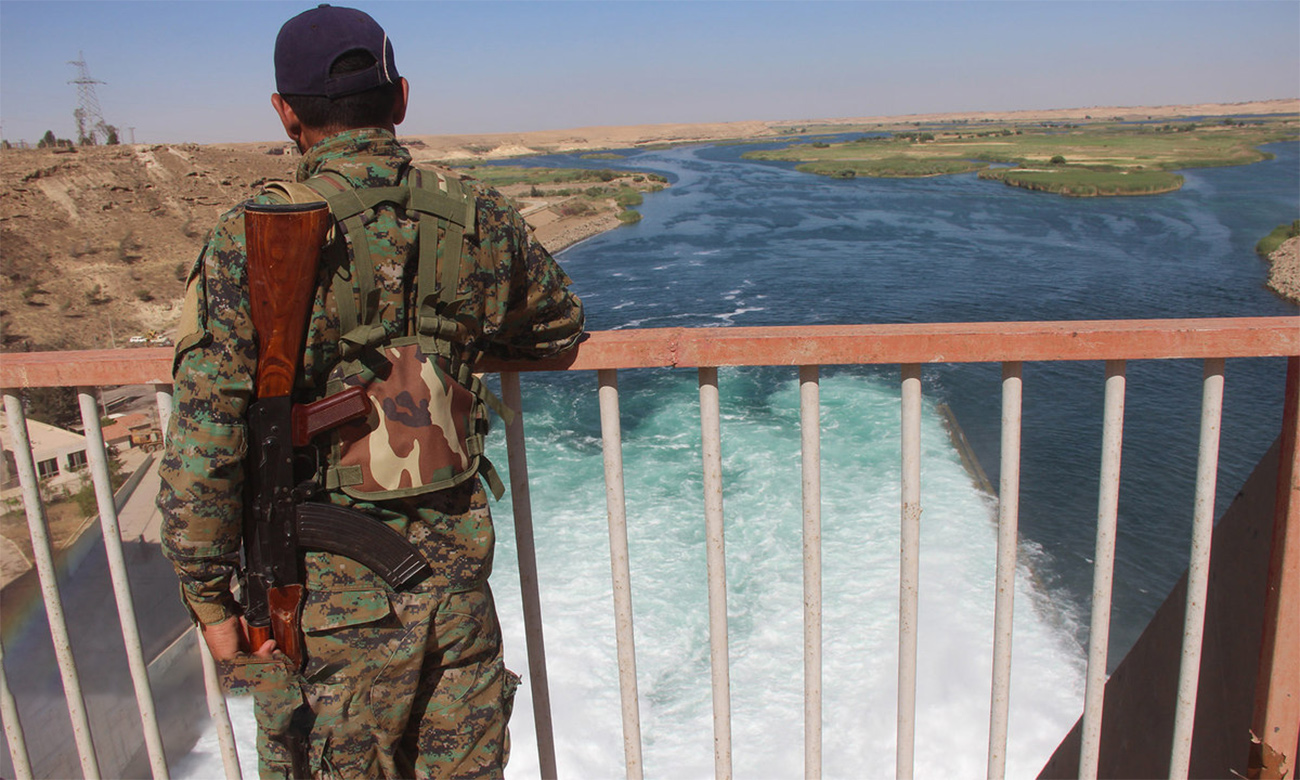



“Since the “Syrian Democratic Forces (SDF)” entered the al-Tabqa area in 2017, they appropriated my house and turned it into a military headquarter for them. All my attempts to claim my house have not succeeded, and I am left with nothing but promises from them. I waited so long that I became tired of waiting.”
With these words, Nayef (a pseudonym) describes what happened to his house in al-Tabqa city in the western countryside of al-Raqqa province. Nayef spared no effort to regain possession of his home, and his condition is similar to many residents of al-Tabqa, who live abroad.
Nayef, who preferred not to mention his real name for security reasons, said, “because I was staying in Saudi Arabia, I sent a power of attorney to my cousin in al-Tabqa, and we certified it from the military council of the SDF.”
He continued saying, “the SDF did not accept a power of attorney and refused to evacuate my house. The forces told my cousin that even if the owner himself comes; they would not hand over the house because its location is important to them.”
Nayef added to Enab Baladi, “I hired a lawyer to follow up and work on restoring the possession of my house and used mediators for this purpose.”
“The SDF promised to leave my house within six months, but years have passed, and they did not leave,” Nayef said.
He said, “I know a lot of homeowners whose houses were confiscated by the SDF, including my brother’s house currently staying in the United Arab Emirates (UAE), and my neighbor’s house, who works in Kuwait.”
Several families in al-Tabqa and al-Raqqa cities lost their homes, either because of their destruction or seizure by the SDF under security and routine pretexts.
As some families lost their official documents during the war, it became difficult for them to prove their houses’ ownership. Moreover, the “Autonomous Administration of North and East of Syria (AANES)” did not acknowledge the property sales that took place under the control of the so-called Islamic State (IS) organization, arguing that these transactions were informal.

A house in the al-Tabqa city seized by the “Syrian Democratic Forces (SDF)”, 2020, (Activists from al-Tabqa)
On 10 May 2017, the SDF announced its control over the entire al-Tabqa city after months of fighting against the IS organization, in operation called the “Euphrates Anger” that led to controlling large areas of the al-Raqqa province.
The SDF handed over the al-Tabqa city’s administration to a civil council of its residents. Still, it controlled the city on the security and military levels, surrounded it with checkpoints, and forced most of the laws of the AANES on it.
The SDF appropriated several houses in the first, second, and third neighborhoods of al-Tabqa, owned by employees of the “Euphrates Dam” project or the “General Establishment for Land Reclamation,” according to activist Hassan al-Qassab from the city of al-Raqqa.
Speaking to Enab Baladi, al-Qassab pointed out that many of the employees who came to al-Tabqa from other cities such as Homs, Hama, al-Salamiyah, al-Mukharram, As-Suwayda, and others, to work in government institutions there, had their houses appropriated by the SDF.
He clarified that the owners left the city after the opposition factions controlled it in 2013. During the IS’s control, the organization seized the houses and placed its members’ families in them. However, after the Islamic State was forced out of the city and the SDF controlled the area, some homeowners returned for a while, then they left, leaving their house to be appropriated by the SDF.
Al-Qassab added that many owners sent power of attorney to their neighbors or friends in the al-Tabqa city to rent, sell, or occupy their houses; however, the SDF refused the documents and rented the houses for its benefit.
He pointed out that many times the SDF handed over the houses to their owners but seized them again a week or ten days later, and the situation continues like this.
Al-Tabqa city is divided into two parts; the first is the “neighborhoods” part, which includes three neighborhoods close to the banks of a vast lake considered the most remarkable and beautiful landmark in the city.
The lake is a water body built behind the “Euphrates Dam” in 1968 on the “Euphrates River.” The battels have largely destroyed this part of the city, and the effects of bombing appear to be evident in the city’s destroyed buildings and bullet remnants.
As for the al-Tabqa city’s second part of the (market), it is a popular area divided into several districts, most of which include lateral (informal) houses. It also has modern buildings of two or three floors, in tune with the area’s popular nature that is similar to a village. According to the residents, this area has not experienced much damage or destruction.
Activist Muhab Nasser from al-Tabqa confirmed to Enab Baladi that the SDF had confiscated a large number of houses left by their owners. He indicated that the confiscation operations also included shops and agricultural lands on a smaller scale.
Nasser said that after the SDF stabilized its presence in al-Tabqa by the end of 2017, it began to seize the property of those absent from the area, under the pretext of “protecting the absentee’s property.”
He pointed out that these owners were mostly government employees from different governorates and not from the local residents.
Nasser said the city of al-Tabqa was like a “mini-Syria,” as it brought together people from all regions and sects, as well as people who had Palestinian identity documents.
Due to the war, these people were forced to leave to areas under the Syrian regime’s control or have taken refuge in Europe or Turkey.
According to Nasser, the SDF’s confiscation operations also included houses owned by families from the city traveling to other countries.
Nasser added some of the confiscated houses were transformed into military headquarters by the SDF or handed over to its elements. Simultaneously, the SDF leased the majority of the houses to displaced people in the area for its benefit.
According to Nasser’s expression, the SDF forced the tenants to pay the rent to it instead of the original property owners, making the SDF lots of money.
Even though some real estate owners returned to the city to claim their properties, the SDF has required the owners to stay at their houses and prevented them from leasing them to someone else. Besides, once the owners leave the city, the SDF reappropriate the properties, according to Nasser.
The joint head of the executive council in al-Tabqa city, Mazloum Omar, confirmed that the council has no decision to confiscate the properties of the absentee, denying any appropriations or exploitation of people’s properties.
Omar said to Enab Baladi that the “absentee property protection and management” office manages lease contracts through the power of attorneys from the “Social Justice Bureau.” He added that the absentees can authorize any person holding the Syrian nationality, as power of attorney is not exclusive to the owners’ relatives.
He added that real estate selling and purchasing transactions are only concluded after the property owner proves his/her ownership in the “Social Justice Bureau,” and is then entitled to sell in person or through the proxy of a person from the region.
Responding to charges brought against the SDF of expropriating or renting the properties of those who left the city due to war and taking the revenues, Omar noted that the SDF is a military body that has forces to defend the people and the interests of the AANES, and does not interfere in civil or real-estate affairs.”
“The SDF is committed to its position in the military points identified by the executive council and is not authorized to take over civilian houses or dispose of the absentees or the people’s properties,” Omar said.
He added, “the SDF cannot dispose of the properties without reviewing the executive council, and its members are also included in the laws imposed on the civilians.”
Omar continued saying that “there are no acts of disposal or use of property, and if any, they are in coordination with the owner or a relative with the owner’s consent.”
Omar pointed out that areas under the AANES control witnessed a massive exodus of Syrians to them. The AANES is working on attracting all segments of Syrian society and helping them achieve stability and practicing agriculture, according to his expression.
Today, al-Tabqa city is home to lots of its original residents who were displaced during the period of the IS organization’s control, displaced persons from Deir Ezzor province and other nearby areas.
The “Autonomous Administration” has restored some basic services to the city. Civil organizations and rehabilitation and construction workshops have helped create job opportunities in various sectors in the al-Tabqa city.

A fighter of the “Syrian Democratic Forces (SDF)”standing on the Euphrates River in al-Tabqa city, west of al-Raqqa- 15 May 2017 (Enab Baladi)
The director of the “Justice for Life (JFL)” organization, lawyer Jalal al-Hamad, confirmed that international laws applicable in conflict situations over governing and on non-governmental military actors, namely the international humanitarian law and the international human rights law, require all forces to protect the property of civilians. Article 17 of the “Universal Declaration of Human Rights”, states that “no one shall be arbitrarily deprived of his property,” al-Hamad said.
Al-Hamad added to Enab Baladi that the SDF is one of the military actors in Syria; thereby, it must abide by the mandate to protect civilian property and not tamper with it.
He also pointed out that the Syrian Constitution is very clear on protecting citizens’ property, as article 15 of the 2012 constitution states that “the collective and individual private ownership shall be protected in accordance with the following basis:
Al-Hamad added that what the SDF is doing and other dominant parties violate the Syrian constitution. All of these parties are flouting all constitutional and legal provisions that impose clear provisions on civilian property protection. Like many military factions, these parties exploit the current situation, the conditions of civilians, especially displaced persons and refugees, and tamper with their properties, al-Hamad said.
Al-Hamad considered that although the SDF canceled the “absentee property protection and management” law issued last August, it is still applying it on the ground through seizing civilian properties and renting them for profit.
The “absentee property protection and management” law provides for the formation of a committee headed by two officials that would manage the property affairs of the northeastern Syrian population abroad, not to claim ownership but to have the opportunity to invest in them.
This means that, despite the SDF claim to abide by international laws and to repeal the law in response to the local people’s needs, it continues to practice such violations on the ground, which is a clear violation of international laws applicable to Syria as being involved in a conflict.
On 5 August, the “General Council” of the AANES issued Law No. 7 of 2020, which consisted of 21 articles under the title “the absentee property protection and management,” to suspend it later on 12 August.
The “General Council” of the AANES announced that it would reconsider and redraft the law to avoid “the consequences of applying the law that could arise from misunderstanding or having different interpretations of its articles.”
The “absentee property protection and management” law is considered the first of its kind in the areas under the control of the “Syrian Democratic forces,” which deals directly with the property of “anyone who has left Syrian territory for a year or more for permanent and continuous residency abroad,” according to the law.

Residential buildings overlooking the Euphrates River in al-Raqqa city, northern Syria – 09 July 2020 (Enab Baladi)
Regarding the measures for dealing with property sales that took place during the Syrian war and were not officially registered in the cadastre, al-Hamad pointed out that in cases where a sale contract between two parties is available in the presence of witnesses, even if it was not registered, the SDF has to acknowledge it, after requesting the appearance of the two parties of the contract and the witnesses before a court affiliated to it.
He pointed out that the non-recognition of these sales is a violation and an assault on people’s right to dispose of their properties, which obliges all the dominant parties, including the Syrian government, to find mechanisms to deal with thousands of contracts and transactions that were not registered in the state institutions.
Al-Hamad considered that the SDF and other armed factions use the non-registration of contracts as a pretext to invest in the residents’ properties of the areas they control.
He also noted that the SDF refusal of the power of attorney documents violates the natural right of people to authorize another person since every person has the right to do a particular legal act in his or her interest, which is in accordance with the definition of the power of attorney (POA) of property contracts.
On the other hand, al-Hamad pointed out that the SDF has so far refused to deal explicitly with local human rights institutions. In addition, the SDF does not grant licenses to these institutions to operate in its controlled areas. The SDF closes the doors to human rights work to document and monitor its performance while its members engaged in widespread violations.
Al-Hamad believes that there are parties inside the SDF that disregard all international laws and calls for a commitment to human rights. Other SDF parties seek to respond and adapt to international laws and show somehow positive reactions to them.
Al-Hamad added, “we are facing a very complex situation in which wings inside the SDF contribute to making things even more complex, which has a significant impact on local peace and stability in the region.”
if you think the article contain wrong information or you have additional details Send Correction